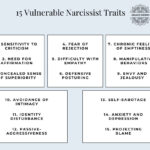How to Make a Narcissist Fear You – 20 Proven Techniques
Dealing with a narcissist is emotionally draining and can have adverse effects on your well-being with long-lasting traumatic effects. Ideally, the best approach is to remove yourself from the relationship because engagement often results in a losing battle.
However, if you’ve found yourself in a situation where you need to learn how to make a narcissist fear you, I’ve got you covered.
This blog post is dedicated to those who need to shift the power dynamics in their relationship as a critical survival strategy. We will explore 20 powerful techniques designed to equip you with the necessary tools to regain control and reclaim your power.
I don’t want you to feel alone in this journey as it makes things a thousand times worse. I’m here to help you through ongoing support, guidance, and compassion.
If you’re interested in healing from narcissistic abuse, I warmly welcome you to my Narcissistic Abuse Recovery Program. It’s an easy self-paced online course which you can do at your own pace. My signature program combines scientific and spiritual tools for holistic healing of the body, mind, and spirit.
20 Effective strategies on how to make a narcissist fear you
Recognizing narcissistic personality disorder as classified in the Diagnostic and Statistical Manual of Mental Disorders (DSM-V) by the American Psychological Association (APA) is pivotal. This understanding helps in acknowledging that you’re dealing with individuals carrying a unique mental health condition. Narcissists are known for their notoriously challenging behaviors.
To better navigate interactions with narcissists, it’s advisable to familiarize yourself with their behavioral patterns and narcissist red flags. Armed with this knowledge, let’s delve into the 20 effective strategies on how to make a narcissist fear you:
1. Establish Boundaries:
Narcissists often disregard personal boundaries and they find them threatening as they view them as challenges to their controlling behavior. It’s important to be clear, direct, and consistent about your boundaries as they are there to protect you.
Define what is acceptable and unacceptable behavior for you and communicate this assertively. When they attempt to cross these boundaries, firmly reassert them. Remember, it’s vital for your mental health to ensure these boundaries are not violated or compromised.
Related: Setting boundaries with a narcissist
2. Be Assertive, Not Aggressive:
There’s a fine line between being assertive and aggressive. Standing up for yourself is essential when learning how to deal with a narcissist. But it’s important to do so without aggression. Otherwise they might get aggressive or use your aggression against you.
Speak your truth firmly and calmly, expressing your needs without attacking or blaming the narcissist. The fact that you can stay calm and composed frightens the narcissist as they try hard to push our buttons to get narcissistic supply.
Also, keep in mind that aggressive reactions can lead to escalated conflicts, providing the narcissist with the drama they crave. Being assertively calm disengages their power to manipulate the situation.
3. Prioritize Self-Care:
Narcissists often resort to belittling and degrading remarks as a way to erode the self-esteem and self-worth of their victims. Their goal is to weaken you to the point where they can easily manipulate and control you, using your energy to fuel their narcissistic needs.
However, when it comes to figuring out how to frighten a narcissist, one of the most potent weapons in your arsenal is building up your physical, emotional, and mental resilience. This can be achieved by prioritizing self-care and activities that nurture your well-being.
Incorporate a balanced diet, regular exercise, and sufficient sleep into your routine. Engage in activities that promote stress reduction such as meditation or yoga. By establishing a robust self-care regimen, you not only bolster your resilience against the narcissist’s manipulative tactics, but you also enhance your overall well-being.
This, in turn, boosts your self-esteem and sense of self-worth, reinforcing your defenses and making you less susceptible to the narcissist’s harmful strategies. As a result, you create an environment that challenges their power over you, effectively inducing a sense of fear in the narcissist.
Related: 10 Things Narcissists Do When You Go No Contact
4. Challenge their ego:
One of the 12 traits of a narcissist is having inflated egos and a sense of superiority. They thrive on admiration and the feeling of being the most important person in the room. Consequently, a powerful strategy to make a narcissist fear you is to challenge their ego subtly and respectfully (because you don’t want to become like them).
For instance, in a group setting, instead of showering the narcissist with the attention they crave, distribute your attention equally amongst everyone. Narcissists can’t stand being ‘just another person’ in the crowd. By not making them the center of attention, you’re challenging their elevated sense of importance.
Another example could be in a conversation, where you could respectfully disagree with their point of view instead of simply conforming. This shows that you’re not easily swayed by their opinion and have a mind of your own.
You could also commend others in their presence for their achievements, subtly undermining the narcissist’s perceived superiority. For example, if they boast about their recent business success, acknowledge it and then bring up a mutual acquaintance’s similar achievement. This is a subtle way to challenge their ego without causing an overt conflict.
5. No Reaction is the Best Reaction:
At the heart of a narcissist’s behavior is their need for attention – they feed off the emotional responses of others. This “narcissistic supply” is like oxygen for them, and they often provoke emotional reactions intentionally, whether they’re positive or negative, to fulfill their desire for control and validation.
Consequently, when learning how to make a narcissist panic, one effective strategy is to refuse to give them the emotional response they’re fishing for.
For example, if a narcissist tries to provoke you with a hurtful comment or belittling joke, instead of responding with anger or hurt, maintain a neutral expression. Deny them the satisfaction of seeing you upset. By keeping your cool, you are showing them that their tactics aren’t affecting you, disrupting their control over your emotions.
Similarly, if they attempt to manipulate you into a situation that serves their interests at your expense, calmly and firmly decline. The key is to remain composed and emotionally detached, which prevents the narcissist from manipulating your feelings.
This approach takes practice, as it can be challenging not to react, especially to personal attacks. However, over time, withholding your reaction can lead to the narcissist feeling confused and disoriented, leading to a sense of panic as they realize they’re losing their grip on you. This strategy is about regaining control over your emotional landscape and not allowing the narcissist to manipulate it.
6. Maintain Your Independence:
Narcissists tend to control the decisions and actions of others. They strive to foster dependence in their victims, making it easier for them to maintain their influence and control.
Maintaining your independence is one of the most effective narcissist scare tactics. This makes them feel threatened as they feel like they are losing control over you.
The first step to ensuring your independence is making your own decisions. Regardless of how persuasive the narcissist might be, always remember that you have the final say in your actions and decisions. Whether it’s about your career, personal life, or mundane daily choices, the decision should always be yours.
Secondly, don’t let the narcissist isolate you from your support network. Narcissists often attempt to cut their victims off from friends and family to increase their dependency. Maintaining these connections helps to counteract their manipulation.
Moreover, invest in yourself. Pursue your interests and hobbies, develop your skills and knowledge. This enhances self-confidence and reduces the impact of the narcissist’s attempts to belittle or undermine you.
Finally, establish and maintain financial independence. If possible, avoid financial entanglement with a narcissist, as this is a common control tactic.
Preserving your independence, while challenging, is a crucial measure. It reinforces your self-worth and personal power, making it harder for the narcissist to manipulate or control you. In turn, this creates an environment that can instill fear in the narcissist as they realize their strategies are ineffective.
7. Seek Support:
It’s critical to surround yourself with supportive and understanding people when dealing with a narcissist. This step plays a significant role in learning how to make a narcissist fear you and even more so when a narcissist is scared of you.
When I was in a relationship with my ex narcissist, I vividly recall how sharing my concerns about our relationship with others would trigger panic in him. He would insist that these matters were private and that I shouldn’t be discussing our relationship issues with anyone else. This reaction was rooted in his fear of damaging his reputation, a common fear for narcissists who often care deeply about how others perceive them.
Building a network of support provides you with multiple perspectives and validation for your experiences, something narcissists often work hard to undermine. It can be therapeutic to speak with friends and family who can support you.
Additionally, consider joining support groups for people who have experienced narcissistic abuse. Hearing others’ experiences can be validating and offer helpful insights.
Related: Is My Husband a Narcissist Quiz
8. Don’t Justify, Argue, Defend and Explain (JADE):
In the context of narcissism, JADE stands for Justify, Argue, Defend, and Explain. It’s a common cycle that victims find themselves trapped in when attempting to reason with a narcissist. Unfortunately, instead of facilitating understanding, JADE often provides the narcissist with more ammunition to manipulate.
For instance, when you justify your actions, a narcissist may see this as a sign of doubt and exploit it to make you feel guilty. When you argue or defend yourself, it can lead to an endless cycle of blame and criticism. Trying to explain your feelings or perspective often falls on deaf ears, as narcissists typically lack empathy and use your words against you.
By refusing to engage in the JADE cycle, you limit the opportunity for the narcissist to manipulate the conversation. This strategy can help you maintain your self-esteem and control during interactions. As a result, you end up showing the narcissist that their usual tactics are ineffective which makes the narcissist panic.
9. Self-Affirmation:
As part of the process of learning how to make a narcissist fear you, it’s essential to keep reminding yourself of your worth and value. Narcissists often employ devaluation tactics, aiming to undermine your self-esteem to make you easier to control.
To counteract this, regular self-affirmation can be a powerful tool. Use positive affirmations that remind you of your strengths, achievements, and unique qualities. For instance, regularly tell yourself statements like, “I am strong,” “I am capable,” or “I am deserving of respect and kindness.”
These affirmations act as an antidote to the narcissist’s negative influence and reinforce your sense of self-worth. When you truly believe in your value, the narcissist’s attempts to belittle you lose their power, contributing to the fear that their manipulation tactics are becoming futile.
Related: Codependency Affirmations
10. Educate Yourself About Narcissism:
When it comes to dealing with a narcissist, knowledge truly is power. Understanding their tactics can go a long way in helping you avoid falling into their traps and strengthening your defenses.
Start by familiarizing yourself with the common traits and the narcissist checklist. Recognize their manipulation techniques, such as gaslighting, love-bombing, devaluation, and discard, also known as the narcissistic abuse cycle.
Additionally, educating yourself about narcissism will help you understand that their hurtful actions and words reflect their own insecurities and not your worth.
In essence, the more you know about narcissism, the less likely you’ll be blindsided by their tactics. This knowledge can make a narcissist fear you as they realize they can’t manipulate you as easily as they intended.
11. Limit Your Exposure:
Minimizing your contact and interaction with the narcissist is a key strategy in reducing their influence over your life. This might involve setting strict boundaries around communication, spending less time in their presence, or, in more extreme cases, considering no-contact or low-contact arrangements.
Limiting exposure can reduce the opportunities the narcissist has to manipulate or hurt you. It’s akin to reducing the dosage of a harmful substance. The less you’re exposed to their negativity, the less damage they can inflict. This decrease in control can often make a narcissist panic as they fear they’re losing their power over you.
12. Practice Emotional Detachment:
Don’t allow the narcissist’s words or actions to dictate your emotional state. This involves viewing their behavior objectively, without letting it touch your self-worth or happiness.
It’s like becoming a calm observer, not absorbing their negativity. Emotional detachment is a skill that takes time and practice but can significantly reduce a narcissist’s control over you.
13. Document Everything:
If you’re considering divorcing a narcissist or if their actions could potentially lead to other legal issues, documenting every interaction becomes crucial. Maintain a meticulous record of emails, texts, and any confrontational incidents with specific dates and details.
This tangible evidence can be indispensable during divorce proceedings or other legal disputes, providing objective proof of the narcissist’s behavior. It can also serve as a powerful deterrent for a narcissist who fears the exposure of their manipulative tactics. This strategic approach on how you make a narcissist fear you, reinforces your preparedness and strength in the face of their attempts to dominate or intimidate you.
Related: Why a narcissist won’t divorce you
14. Stay True to Your Reality:
Gaslighting and manipulation are narcissist tactics designed to make you question your experiences and perceptions. It’s paramount to trust your instincts and the reality of your situation, despite their efforts to distort it.
To strengthen your trust in your perceptions, it’s helpful to regularly practice mindfulness exercises, such as meditation, which can enhance self-awareness and intuition. A journal can also be a powerful tool. This allows you to document your experiences and feelings, which can later serve as a reference when doubts arise.
Regularly consulting trusted friends, a therapist or a coach can also help validate your experiences and reinforce your reality. As you grow more confident in trusting your own perceptions, you’ll become less susceptible to the narcissist’s gaslighting attempts. This solid grounding in your reality can, in turn, make the narcissist fear their manipulations are losing their intended effect.
15. Avoid Personal Information Sharing:
It’s wise to limit the amount of personal information you share with a narcissist. The more they know about your thoughts, feelings, and life, the more ammunition they have to manipulate and control you.
This includes your weaknesses, fears, dreams, and past experiences. Consider adopting a policy of sharing only what’s necessary, and be mindful of the information you divulge, particularly if it could be used against you.
By carefully managing the personal information you disclose, you diminish the narcissist’s arsenal of manipulation tools. This can make the narcissist fear you as they realize they’re losing their grip and don’t have the usual insights to exploit. Your decision to maintain a private inner world that they can’t infiltrate can signal your resistance to their control, unsettling them.
16. Stay Focused on Your Goals:
Narcissists often try to derail your focus from your personal goals to keep you under their influence. They might belittle your ambitions, create distractions, or instigate conflicts to divert your attention. It’s essential to maintain a strong focus on your aspirations and not let the narcissist’s actions sidetrack you. This could be career goals, personal development, or any other pursuits that matter to you.
By keeping your goals at the forefront, you demonstrate your independence and resistance to their control. This can make a narcissist fear your self-sufficiency and determination. The steady pursuit of your goals, despite their attempts to distract or dissuade you, serves as a powerful indicator of your resilience. This can make the narcissist panic as they realize that their influence over you is waning, and they can no longer dictate your life’s direction.
17. Recognize Their Projection:
Often, narcissists’ criticisms are a reflection of their own insecurities. They project their faults onto others to avoid confronting their inadequacies. By understanding this, you can see their criticisms for what they are: attempts to deflect from their shortcomings, not an accurate reflection of your character.
This perspective can help shield your self-esteem from their attacks. Recognizing their projection also empowers you and disrupts their manipulative tactics. When you’re unfazed by their projections, narcissists can start to fear your understanding of their game.
18. Practice Mindfulness:
Staying present can help you avoid getting caught up in the narcissist’s manipulative tactics. Mindfulness involves focusing on the present moment and accepting it without judgment.
This can create a mental space where the narcissist’s attempts to manipulate your feelings and reactions are less impactful. When you’re mindful, you’re less likely to be drawn into their emotional dramas.
As you cultivate mindfulness, the narcissist may begin to fear your ability to remain unaffected by their ploys, making their manipulative efforts increasingly ineffective.
19. Maintain a Positive Self-Image:
Don’t let the narcissist’s demeaning behavior define you. Narcissists often try to erode your self-esteem to gain control. By maintaining a positive self-image and affirming your worth, you shield yourself from their harmful influences.
Your ability to uphold a strong self-image, despite their relentless attempts to undermine it, can cause fear in the narcissist, as it signifies their diminishing power over your self-perception.
20. Seek Professional Help:
Therapists, counselors and coaches can provide valuable strategies and support for dealing with narcissists. A professional can help you navigate the complexities of narcissistic behavior and equip you with effective coping mechanisms.
Expert guidance can bolster your resilience and empower you in your interactions with the narcissist. When a narcissist sees you actively seeking professional help and growing stronger through it, they may fear the loss of control and influence, as they recognize that you are not fighting this battle alone.
For this reason they may try to discourage you from seeking support. They might also call you crazy for speaking with a therapist trying to shame you and holding you back from breaking free from their power.
It’s important not to let their discouragements hold you back; their attempts to belittle your decision to seek help is yet another manipulative tactic to maintain their control.
Start your journey towards a healthier and more empowered self today. Join my Group Narcissistic Abuse Recovery Program and gain access to the professional guidance you need. Click here to join and start reclaiming your life from narcissistic abuse.
My Related Services:
–Narcissistic Abuse Recovery Program: Join a structured program that provides tools, resources, and guidance to help you navigate and heal from the impact of narcissistic abuse.
–Email Advice: Get guidance, insights, and support directly to your inbox.
FAQs
Here are 10 effective strategies to make a narcissist fear you:
1. Establish clear boundaries.
2. Be assertive, not aggressive.
3. Prioritize self-care.
4. Stay focused on your goals.
5. Show no reaction to their provocations.
6. Maintain your independence.
7. Seek support.
8. Challenge their ego.
9. Practice self-affirmation.
10. Educate yourself about narcissism.
The thing that scares a narcissist the most is losing control and the fear of being exposed or seen as imperfect in the eyes of others.
To make a narcissist panic, maintain your independence, don’t react to their provocations, and stay focused on your own goals. This disrupts their control and can trigger fear and panic.
Additional Resources:
40 Signs A Narcissist Is Done With You
Things Covert Narcissists Say
Weird Things Covert Narcissists Do
Do Narcissists Know They Are Narcissists?
How Does a Narcissist React When They Can’t Control You?
How Does a Narcissist React When You Stop Chasing Them?







